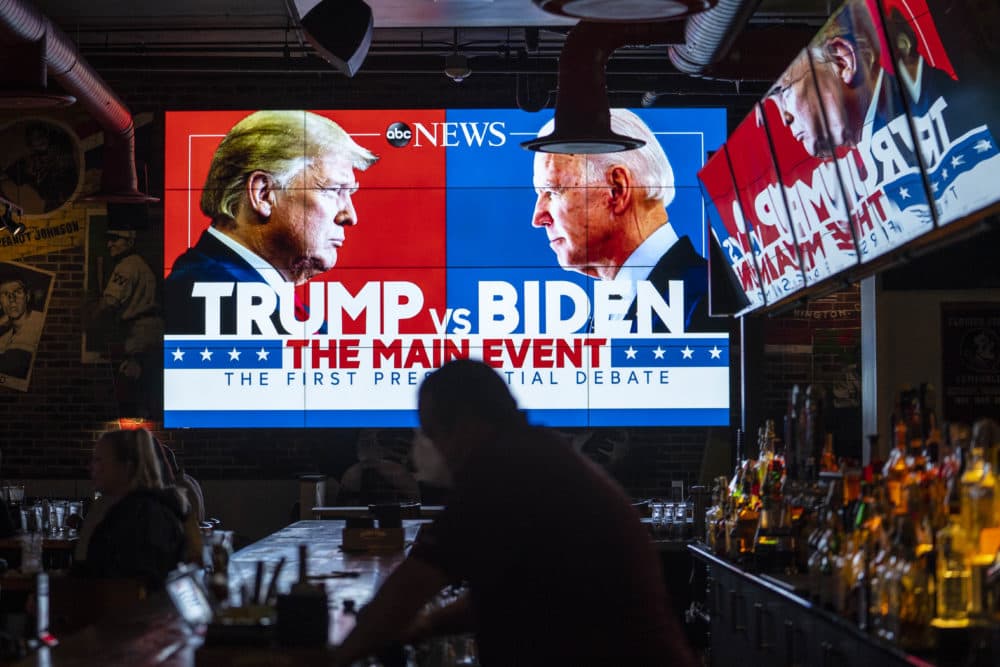Advertisement
WBUR Town Hall Highlights: Now What? The Impact Of The 2020 Election

In 2020, Americans have faced unprecedented simultaneous challenges: the COVID-19 pandemic, the subsequent economic fallout, a reckoning with racial justice and a mounting climate crisis to name only a few.
The presidential election has ended with now President-elect Joe Biden winning more than the required 270 electoral votes needed to defeat President Trump. Trump has yet to concede, and as inauguration day — Jan. 20 — rapidly approaches, the country is left to wonder: What will happen next?
Tonya Mosley, co-host of NPR and WBUR’s Here & Now, spoke with NPR’s Ron Elving, senior editor and correspondent, Washington Desk; Tamara Keith, White House correspondent; and Asma Khalid, political correspondent and co-host of “The NPR Politics Podcast” about these topics.
Event Highlights
On why so many Americans still support President Trump
Ron Elving: “Why do so many Americans still really like Donald Trump? One of the reasons I think they do is because he doesn't care about all those norms. He doesn't care about all the things that those of us who have made our lives in Washington, D.C., even, you know, it only takes five or 10 years before you sort of become a Washington, D.C. swamp creature. If you really care about those things, you are almost automatically detaching yourself from the essential emotional feelings of most Americans. Most Americans have more of a feeling of hostility towards Washington than anything else.
“And we've seen candidates certainly back to Ronald Reagan and even in his own way, Jimmy Carter run against Washington. It’s really become almost a cliche. And I remember being shocked when Bill Clinton got away with being basically a womanizer and a draft dodger. And we knew that before the first primary in 1992 and people still voted for him. So norm-busting has actually been around for a little longer maybe than some Trump critics would say or want to think. And I think we have to see norm-busting as being an inhibitor of governing. Certainly it was an inhibitor of Donald Trump's effectiveness as president, but it was also a major connection to the feelings of American voters.”
Advertisement
On the changing identities of America’s political parties
Tamara Keith: “In answering the question about what people should do about discomfort with where their party is headed, I think part of the answer that I often think about with American politics is just that people would be much better served spending more time thinking locally than focusing on national politics and focusing on the hot Senate race or spending all your time worrying about the president. You can make a much bigger difference. And if you're worried about your party, you can change your party from the ground up by getting involved and focusing more locally. You can make a bigger difference in your life and your community by focusing locally.
“But in terms of the parties more broadly in the challenges they face, you know, for the Republican Party, Donald Trump casts a really large shadow. And there are a bunch of people who are making trips to Iowa and New Hampshire for the last couple of months, “campaigning for President Trump”, who are going to be in a total purgatory mode if the biggest name in the Republican Party, the one who has all of the small donors, the big guy who gets all the attention, if he's still talking about running for president or otherwise putting his finger on the scales or blocking the sun for them. You know, whatever great reckoning about who the Republican Party is isn't going to be able to happen if Donald Trump, who turned it into his party, is still the guy.”
On the evolution of political coverage
Asma Khalid: “Regardless of whether or not we as a network cover Donald Trump, to me that feels like the secondary question in a mission that I have been very, very strongly advocating for in the network, which is that, to Ron’s earlier point, 70-plus million people in this country … voted for Donald Trump.
“And to me the biggest, biggest story that I hope as a network we cover is the cultural civil war in this country. I don't think it's going away regardless of whether or not Trump eventually concedes. So to me, covering Trump feels secondary to the urgent need I feel as a network, whether that's not necessarily the Washington desk but the national team or whoever, to continue to sort of better understand what really feels to me like a cultural civil war in this country.”
Tonya Mosley: “I, 100%, agree with you. I also think we have to interrogate our roles in this cultural civil war and what we cover, how we cover it, how we cover communities, how we can be on the ground and understanding how we get to this place. It's also an interesting, I mean, I use “interesting” lightly, I mean, heavily because I just use that as a placeholder only to say our metabolism as news consumers has changed dramatically ever since the O.J. Simpson trial. I mean, since then, we always want this 24-hour infusion of every little thing that's happening. And Trump is a master at being able to play into that. And so it is a real test but also we have to be super present in understanding as things are happening on our roles and all of this. And what we said is our mission to our audience as well.”
Alex Schneps adapted this interview for the web.




